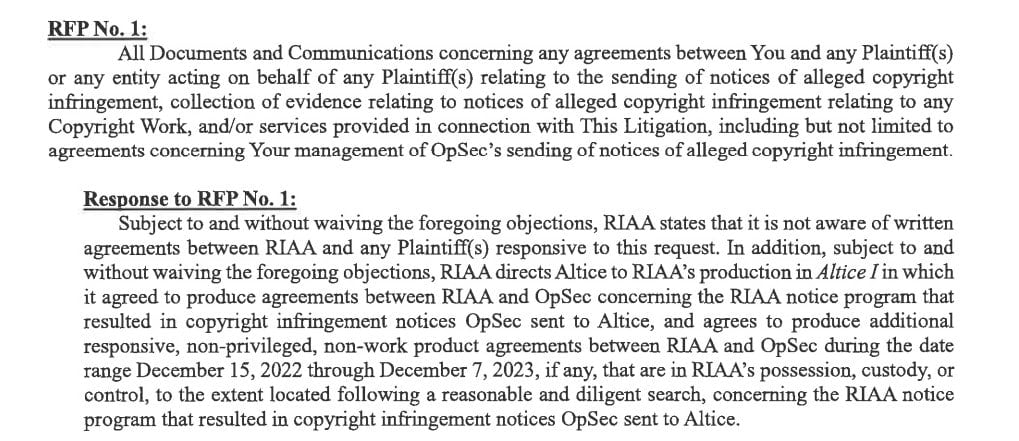Under U.S. copyright law, Internet providers must terminate the accounts of repeat infringers “in appropriate circumstances”.
This legal requirement remained largely unenforced for nearly two decades but a series of copyright infringement liability lawsuits, with hundreds of millions of dollars at stake, have shaken up the industry.
RIAA Labels vs. Altice
These piracy liability lawsuits have targeted large and small Internet providers across the United States. This includes Altice, which was sued by various parties in recent years both directly and indirectly as the owner of ISP Optimum.
This summer, Optimum settled its lawsuit with some music industry giants, including BMG, UMG, and Capitol Records, but that doesn’t mean its legal woes are over.
Last December, a group of nearly 50 music labels filed a similar yet separate ‘mass-infringement’ lawsuit against Altice. All members of the RIAA, these music companies claim the ISP is liable for copyright infringement, alleging that it failed to take action against repeat infringers on the “Optimum” network.
“Despite Altice’s stated policies and despite receiving tens of thousands of infringement notices concerning Plaintiffs’ works […] Altice knowingly permitted repeat infringers to continue to use its services to infringe,” the complaint read.
RIAA Denies Discovery Requests
Nearly a year has passed since the complaint was filed. Both parties are currently conducting discovery, seeking relevant evidence to support their arguments. For Altice, the RIAA is a key target, as the music industry group was involved in events that led up to the lawsuit.
To find out more, Altice subpoenaed the RIAA for what it believes is relevant information. The RIAA responded to the request, but refused to produce several documents, so Altice filed a motion at the federal court, asking it to compel the RIAA to comply.
The ISP is particularly interested in the RIAA’s dealings with anti-piracy vendor OpSec Online. The company was responsible for tracking subscribers’ piracy activity on BitTorrent networks and alerting the associated Internet providers, including Altice. These piracy notices were then used as evidence in the current lawsuit.
“According to Plaintiffs, OpSec’s system was used to detect all of the alleged downloads by Altice’s subscribers that serve as the basis for Plaintiffs’ secondary copyright infringement case against Altice,” the motion reads.
RIAA’s Dealings with OpSec
The RIAA reportedly responded with standard rejections to many of these requests. The music group agreed to hand over a copy of its 2019 agreement with OpSec, but rejected to share any other communications related to it.
According to Altice, this missing context is vital to its defense. It may reveal more about the accuracy and reliability of the piracy notices, for example, including details of potential errors and inaccurate notices.
In addition, the RIAA should also be required to share reports and other details that provide more insight into the scope and purpose of the piracy notice efforts.
“[T]he broader reports are relevant to, for example, (1) how many notices were sent to other ISPs, (2) how the RIAA directed OpSec to gather evidence of piracy from other ISPs, and (3) whether the RIAA had a strategy for bringing suits against the entire ISP industry, and, if so, its motivations for doing so,” Altice writes.

Along the same lines, the RIAA should also disclose about how much it paid OpSec for its services. The music industry group already shared payments between 2020 and 2023, but it should hand over older data too. That will help to establish OpSec’s credibility as a witness, Altice notes.
RIAA’s Other Enforcement Efforts
The remaining information mostly relates to other enforcement efforts. The RIAA is asked to explain how it selects the copyrighted works that are used as evidence in lawsuits, for example, and whether it chose to extend the protection of certain titles, while discarding others.
The RIAA has so far refused to share this information. The same also applies to details of any other enforcement options it considered, including actions against torrent sites and potential lawsuits against providers of file-sharing software.
“These requests are directly relevant to the RIAA’s motivations for pursuing actions against ISPS, like Altice, instead of taking action themselves to address online copyright infringement such as sending notices of infringement to torrent site aggregators […] or taking legal action against providers of peer-to-peer file-sharing technologies.”

Finally, Altice brings up the Copyright Alert System (CAS). This now-defunct voluntary agreement between rightsholders and Internet providers was previously used in an effort to deter infringement. Notably, this industry sanctioned model did not require ISPs to terminate subscriber accounts.
The music labels have sued Altice for its alleged failure to terminate accounts of repeat infringers, so this information is highly relevant to its defense, the company notes. Through the motion to compel, Altice hopes that the court will order the music group to comply.
At the time of writing, the RIAA has yet to respond to the motion. After that, the court is expected to issue a decision.
—
A copy of the motion to compel, as well as an associated request to transfer it to the Eastern District of Texas, is available here (pdf).
Instant update: The motion is transferred to Texas (pdf).
From: TF, for the latest news on copyright battles, piracy and more.
Source : RIAA Should Disclose Anti-Piracy Details, Altice Argues














